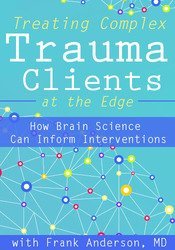

We often get shaken and lose confidence in our approach when a client’s trauma response edges into seemingly uncontrollable dynamics of rage, panic, or suicidal desperation.
Watch Frank Anderson, colleague of Dr. Bessel van der Kolk and Dr. Richard Schwartz, as he provides an essential road map for treating relational trauma cases. Explore the neurobiological processes of hyperarousal and parasympathetic withdrawal and the underlying symptoms.
Watch now and you will also learn various therapeutic techniques and interventions that can be integrated with psychotherapy practices to help soothe your clients’ trauma.
| File type | File name | Number of pages | |
|---|---|---|---|
| Manual - Treating Complex Trauma Clients at the Edge (1.91 MB) | 16 Pages | Available after Purchase | |
| Manual - Treating Complex Trauma Clients at the Edge - French (1.91 MB) | 16 Pages | Available after Purchase | |
| Manual - Treating Complex Trauma Clients at the Edge - Italian (1.91 MB) | 16 Pages | Available after Purchase | |
| Manual - Treating Complex Trauma Clients at the Edge - German (1.91 MB) | 16 Pages | Available after Purchase | |
| Manual - Treating Complex Trauma Clients at the Edge - Spanish (1.91 MB) | 16 Pages | Available after Purchase |

Frank Anderson, MD, completed his residency and was a clinical instructor in psychiatry at Harvard Medical School. He is both a psychiatrist and psychotherapist. He specializes in the treatment of trauma and dissociation and is passionate about teaching brain-based psychotherapy and integrating current neuroscience knowledge with the IFS model of therapy.
Dr. Anderson is a lead trainer at the IFS Institute with Richard Schwartz and maintains a long affiliation with, and trains for, Bessel van der Kolk’s Trauma Center. He serves as an advisor to the International Association of Trauma Professionals (IATP) and was the former chair and director of the Foundation for Self-Leadership.
Dr. Anderson has lectured extensively on the Neurobiology of PTSD and Dissociation and wrote the chapter “Who’s Taking What” Connecting Neuroscience, Psychopharmacology and Internal Family Systems for Trauma in Internal Family Systems Therapy – New Dimensions. He co-authored a chapter on What IFS Brings to Trauma Treatment in Innovations and Elaborations in Internal Family Systems Therapy, and recently co-authored Internal Family Systems Skills Training Manual.
His most recent book, entitled Transcending Trauma: Healing Complex PTSD with Internal Family Systems was released on May 19, 2021.
His memoir, To Be Loved, was released on May 7, 2024.
Speaker Disclosures:
Financial: Dr. Frank Anderson maintains a private practice, is the co-founder of the Trauma Institute, and is the co-founding producer of Trauma Informed Media. He receives royalties as a published author. He receives a speaking honorarium, recording, and book royalties from PESI, Inc. He has no relevant financial relationships with ineligible organizations.
Non-financial: Dr. Frank Anderson is a member of the New England Society Studying Trauma and Dissociation and the International Society for the Study of Trauma and Dissociation.
Please wait ...